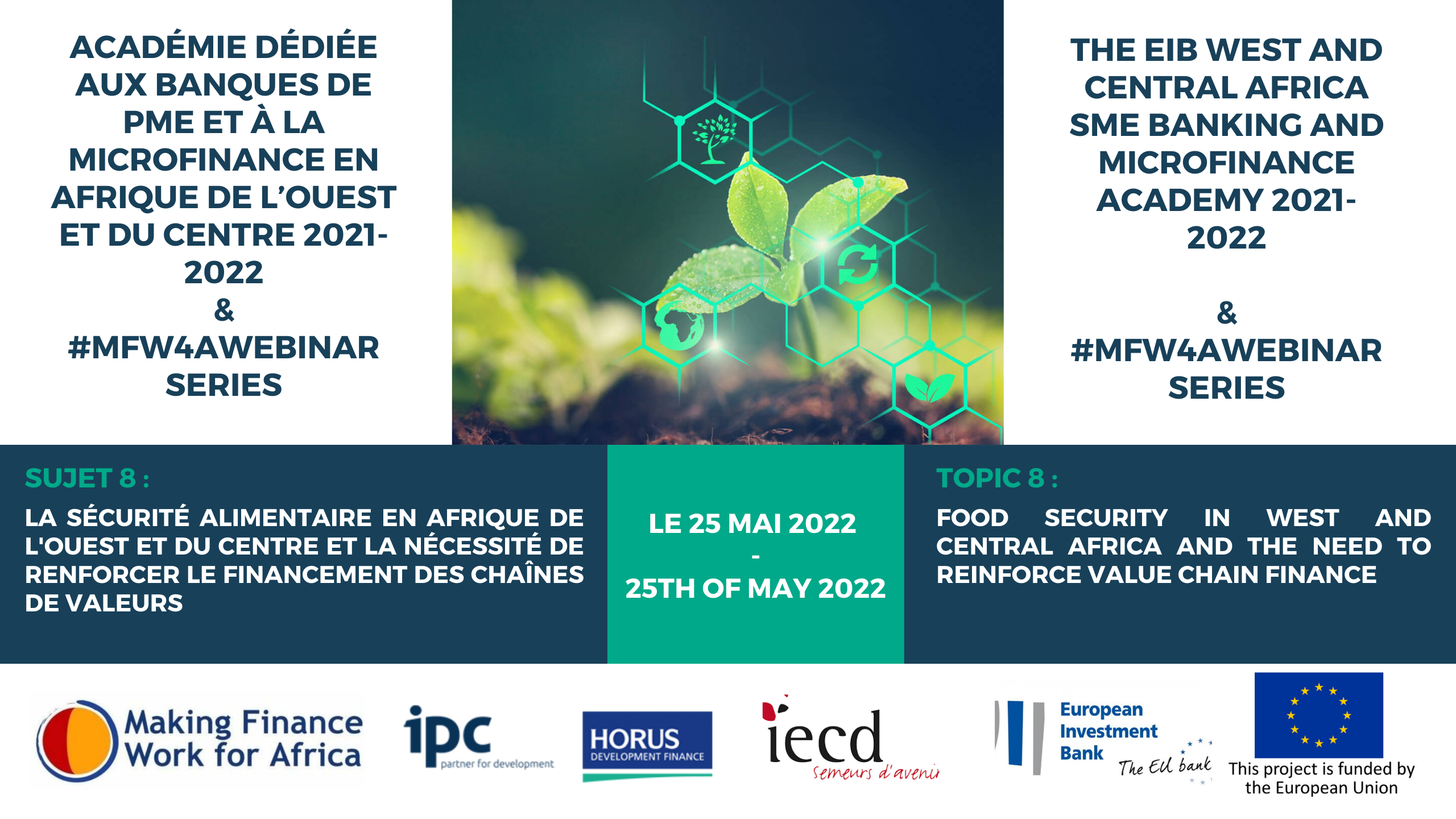The EIB West and Central Africa SME Banking and Microfinance Academy 2022
Webinar series
Topic 8: Food security in West and Central Africa and the need to reinforce value chain finance
25 May 2022, 01 pm GMT (Abidjan) / 02 pm (Cotonou, Douala, Kinshasa)/ 03 pm (Paris, Frankfurt, Lusaka, Harare, Johannesburg) / 04 pm (Addis-Ababa, Nairobi)
The eighth in a series of webinars organized by the EIB Academy dedicated to banks specialized in SME financing and microfinance in West and Central Africa, in partnership with Making Finance Work for Africa (MFW4A), was held on May 25. Its theme was “Food security in West and Central Africa and the need to reinforce the value chain finance”.
This webinar drew an audience of 128 participants, who demonstrated their interest in this important topic through very pertinent questions. At the outset, Hughes Kamewe Tsafack of MFW4A set the stage for the debate and the importance of food security given the demographic pressure in this part of the continent. After the opening remarks by Nikos Milianitis, Head of the European Investment Bank (EIB) Regional Representation for Central Africa, the moderator, Lydie Johnson from the IPC, Horus Development Finance, and IECD consortium, introduced each panelist.
The first speaker, Solène Prince Agbodjan, agricultural finance specialist and credit portfolio manager of Injaro Investments & Agri-Business-Capital Fund (ABC), spoke about reducing the risks associated with agricultural lending and expanding financing opportunities for agriculture. She focused on the perception of risk that banks have towards agricultural SMEs. These include internal and external factors such as lack of operational history, low productivity of enterprises, lack of or low value collateral, and limited knowledge of international markets. Despite these difficulties, financing agricultural businesses is not impossible if the focus is on operational rather than financial performance. She therefore urged bankers to make a proper assessment of transaction risks, understand market rules and regulations, and structure loans that are tailored to the realities of agricultural businesses. Ms. Prince Agbodjan concluded her presentation by suggesting the use of certain tools to reduce the risks associated with agricultural enterprises, such as capacity building for enterprises, the implementation of third-party guarantee systems such as those offered by AGF or USAID, or the purchase of agricultural insurance coverage.
The second speaker, Francis Osei, agribusiness finance specialist and deputy fund manager in charge of operations at the Outgrower and Value Chain Fund (OVCF) in Ghana, went into more depth on agricultural risk assessment and management. He said that in developing agricultural value chains and their financing, the systematic approach taken by the OVCF is that any credit request from a borrower and his or her outgrower partner should be considered within a value chain approach. Thus, typical questions such as who is involved in the value chain, what crop is involved, who is the lead stakeholder in the chain, or who is the weak link in the chain are asked. Any financial institution wishing to finance the agricultural sector needs to know whether there is a market for the crop in the form of a contract. It needs to know the agro-ecological zone in which production takes place, or the different crops and varieties for a given crop that are adapted to that zone. It is equally important to take into account other risks related to agriculture, such as technical risks, market risks, environmental and sustainability risks, financial risks, and legal risks. Their assessment should be based on the 5 C’s of credit methodology, which consists of an examination of collateral, terms and conditions, capital, borrower character and repayment capacity. In terms of risk categories, it is critical for any financial institution to understand, for example, the effect of climate change, agronomic risks, the impact of pests, the cost of borrowing, the selling price of the crop, the effect of imports on competition, and the enforceability of contracts. Francis Osei concluded by reminding the audience that the objective of any agricultural financing must be to ensure an appropriate lending methodology and to ensure that the type of financing instrument is appropriate for the financing objective.
Djedje Kungula Makoso, specialist in agricultural financing and head of the agro-business unit of Equity Banque Commerciale du Congo (BCDC), presented the financing mechanisms of the agricultural sector, notably by sharing his experience within Equity BCDC. He first recalled the diversity of actors in the agricultural sector and the plethora of existing structures such as farmers, suppliers, input distributors, processing companies, transporters or related services. The commercial approach of financial institutions will therefore be decisive in designing agricultural financing mechanisms that are adapted to the needs of individual businesses and groups, cooperatives and other farmers’ organizations. Other elements that are essential for positioning oneself in this market are technical expertise, ease of access to dispersed farmers, a range of dedicated products and services, and adapted management tools, not to mention capacity building for agribusiness clients, which can prove advantageous later on. Equity BCDC uses two financing mechanisms in particular to reach this agricultural clientele. First, it uses credit to producers via a contract with a strong federating or lead firm (Agro Lisanga Credit) and second, bridging credit to producers via agricultural cooperatives (Cooperative Credit). The recipients of these products are farmers (small and medium-sized producers) who are members of a grouping or a cooperative under contract, agricultural cooperatives/IEGs with access to markets and guarantees, and finally agricultural MSMEs with a secure outlet market or a contract with an agribusiness. Finally, the speaker highlighted the advantages of these mechanisms, including the possibility of granting small amounts of credit, the reduction of the burden of physical collateral on the individual farmer, and the possibility of repayment in kind. The reduction of the cost of credit for the farmer is also a benefit.
After an exchange session with the participants, the panelists shared some concluding messages, stressing the importance of ensuring Africa’s food security by strengthening the development of value chains and further facilitating actors’ access to finance.
The webinar concluded on this note.




